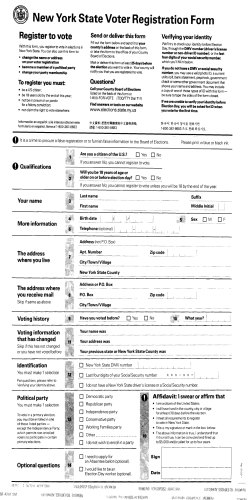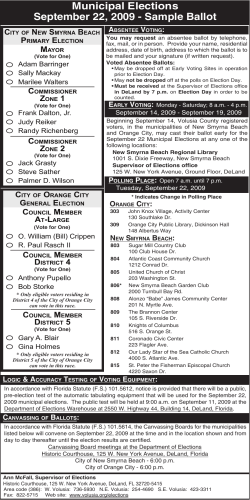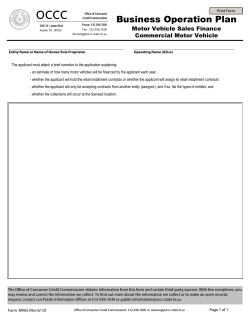
Factsheet – Right to free elections
Factsheet – Right to free elections May 2013 This Factsheet does not bind the Court and is not exhaustive Right to free elections Article 3 of Protocol No. 1 to the European Convention on Human Rights: right to free elections Under Article 3 of Protocol No. 1 to the European Convention on Human Rights, the citizens of Europe are guaranteed free and democratic elections. Even though it is limited in scope to the election of the “legislature” and does not afford an unlimited right, European protection of the right to free elections is of great significance; for the Court it is a “fundamental principle in a truly democratic political regime”. The Court makes a distinction between “active” and “passive” electoral rights, namely between the right to participate in an election as a voter and the right to stand as a candidate for election. Such “passive” electoral rights enjoy a lesser degree of protection than the “active” rights. Right to vote Restriction on right to vote because of national origin Aziz v. Cyprus 22 June 2004 The applicant was unable to vote in the 2001 parliamentary elections on the grounds that, under Cyprus’ Constitution, members of the Turkish-Cypriot Community were excluded from the Greek-Cypriot electoral roll. Violation of Article 14 (prohibition of discrimination) of the European Convention on Human Rights taken together with Article 3 of Protocol No. 1 to the Convention: The Court reiterated that States had considerable latitude to establish rules for parliamentary elections, but such rules had to be justified on reasonable and objective grounds. The difference in treatment of which the applicant complained, resulting from the fact that he was a Turkish Cypriot, could not be justified on reasonable and objective grounds, particularly in the light of the fact that Turkish Cypriots in the applicant’s situation had been prevented from voting at any parliamentary election. Right to vote for citizens living abroad Sitaropoulos and Giakoumopoulos v. Greece 15 March 2012 (Grand Chamber) At the time of the 2007 parliamentary elections in Greece, the applicants were unable to exercise their right to vote in the place where they lived (in France), as no provision was made for voting by Greek expatriates. No violation of Article 3 of Protocol No. 1: The Court notably found that neither the relevant international and regional law nor the varying practices of the member States in Factsheet –Right to free elections this sphere had revealed any obligation or consensus which would require States to make arrangements for the exercise of voting rights by citizens living abroad. Shindler v. the United Kingdom 7 May 2013 The case concerned whether the right to vote of a British national not resident in the United Kingdom since 1982 had been violated by election laws preventing those resident outside of the United Kingdom for more than 15 years from voting. No violation of Article 3 of Protocol No. 1: The Court, taking into account the room for manoeuvre (‘margin of appreciation’) to be left to the United Kingdom Government in regulating its parliamentary elections, decided that the election law in question had not gone too far in restricting the applicant’s right to free elections. Right to vote of persons placed under protection Alajos Kiss v. Hungary 20 May 2010 The applicant lost his right to vote because he had been placed under protection on psychiatric grounds. The Hungarian Constitution provided for an automatic and general restriction on the right to vote of persons placed under protection. Violation of Article 3 of Protocol No. 1: After accepting that the withdrawal of the right to vote pursued a legitimate aim, as stated by the Government, namely to ensure that only citizens capable of assessing the consequences of their decisions could take part in public affairs, the Court emphasised that it could not accept a blanket ban on the right to vote affecting all persons under protection regardless of their actual mental faculties. Prisoners’ right to vote On this subject, see the “Prisoners’ right to vote” factsheet. Eligibility Formal conditions of eligibility Podkolzina v. Latvia 9 April 2002 The applicant stood for election to Parliament in October 1998 in the constituency of Latgale, on the list of the “National Harmony Party”. After an examiner of the State Language Centre came to her workplace on two occasions, her name was struck off the list of candidates on the grounds that she had an inadequate command of Latvian. The law on parliamentary elections provided, as one of the eligibility criteria, knowledge of the official State language - Latvian. Violation of Article 3 of Protocol No. 1: The Court noted that the choice of a national parliament’s working language was one which the State alone had the power to make and that knowledge of a common official language pursued the legitimate aim of permitting the normal operation of the institutional system. However, the Court observed that the applicant had been issued with a valid certificate of linguistic competence, whose validity had not been called into question by the Latvian authorities. The examination imposed on the applicant had thus been devoid of any objective ground and had not corresponded to any statutory condition for eligibility. Sukhovetskyy v. Ukraine 28 March 2006 The applicant wanted to stand for the parliamentary elections of January 2002. Candidates had to pay an electoral deposit of 218.10 euros. The applicant alleged that 2 Factsheet –Right to free elections he could not afford to pay it as his annual income did not exceed that amount. As a result his name was not added to the list of candidates. No violation of Article 3 of Protocol No. 1 The Court observed that the electoral law of a certain number of European States provided for measures that sought to discourage frivolous candidatures. The Court further observed that, among European jurisdictions, the amount of the deposit in Ukrainian law was one of the lowest. It concluded that the fee required of the applicant could not be considered to have been excessive or such as to constitute an insurmountable administrative or financial barrier for a determined candidate wishing to take part in elections. Krasnov and Skuratov v. Russia 19 July 2007 The applicants were accused of providing inaccurate information about their respective posts when they stood as candidates for election to the Duma, and the second allegedly failed to confirm that he was a member of the Communist Party. They were thus declared ineligible. No violation of Article 3 of Protocol No. 1 concerning the first applicant: He had deliberately supplied information likely to mislead voters. Violation of Article 3 of Protocol No. 1 concerning the second applicant: There was nothing to show that the applicant had deliberately provided false information and that he had never concealed his membership of the Communist Party. As a result, his ineligibility could not be justified by the need to avoid any misunderstanding among voters about his political leanings. Disqualification due to prior conduct or affiliations Herri Batasuna and Batasuna v. Spain, Etxeberria and Others v. Spain, and Henrritarren Zerrenda v. Spain 30 June 2009 On 27 June 2002 the Spanish Parliament enacted an organic law1 on political parties. The main innovations concerned the organisation, functioning, dissolution and suspension by the courts of political parties. Under that Law, Herri Batasuna and Batasuna2 were declared illegal and dissolved. Following that dissolution, the candidatures of various electoral groupings for local elections were revoked on the ground that the candidates were pursuing the activities of the dissolved parties. The Court held in particular that there had been no violation of Article 11 (freedom of assembly and association) in the case of Herri Batasuna and Batasuna: the dissolution had been “necessary in a democratic society, notably in the interest of public safety, for the prevention of disorder and the protection of the rights and freedoms of others”. In the case of Etxeberria and Others, the Court held that there had been no violation of Article 3 of Protocol No. 1: It observed that the Spanish courts had sufficiently proved that the illegal groupings had aimed to pursue the activities of Batasuna and Herri Batasuna, which had previously been dissolved on account of their support for violence and the activities of the terrorist organisation ETA. Noting further that the political context in Spain, that is the presence of separatist political parties within the governmental bodies of certain autonomous communities, particularly in the Basque Country, proved that there had been no intention of prohibiting any expression of separatist ideas, the Court considered that its case-law, according to which the expression of separatist points of view did not in itself involve a threat against the territorial integrity of the State and national security, had been complied with. The free expression of the opinion of the people had not therefore been infringed. The Court reached the same conclusions in the case of Herritarren Zerrenda. 1 Law on the organisation and functioning of public authorities. Enacted by Parliament, it sets out or complements the provisions of the Constitution. 2 Far-left Basque separatist political parties. 3 Factsheet –Right to free elections Pending case concerning a political party’s dissolution Demokratik Toplum Partisi and six other applications v. Turkey (application no. 3840/10) Communicated on 13 December 2011 Zdanoka v. Latvia 16 March 2006 (Grand Chamber) The case concerned the applicant’s disqualification from standing for election in Latvia, on account of her past membership of, and activities in, a political party that had been declared anti-constitutional. A law of 1995 barred persons involved in the activities of the post-1991 Latvian Communist Party from standing for election. No violation of Article 3 of Protocol No. 1: While such a measure could scarcely be considered acceptable in the context of one political system, for example in a country which had an established framework of democratic institutions going back many decades or centuries, it could nonetheless be considered acceptable in Latvia, in view of the historico-political context which had led to its adoption and given the threat to the new democratic order posed by ideas which might lead to the restoration of a totalitarian regime. The Court accepted that the national authorities of Latvia had been better placed to assess the difficulties faced in establishing and safeguarding the democratic order. However, the Latvian Parliament had a duty to keep the statutory restriction under constant review, with a view to bringing it to an early end. Paksas v. Lithuania 6 January 2011 (Grand Chamber) The case concerned the applicant’s disqualification from holding parliamentary office. He was a former President of the Republic who had stepped down after impeachment proceedings3 for committing a gross violation of the Constitution and breaching the constitutional oath. Violation of Article 3 of Protocol No. 1: The Court reiterated that Article 3 of Protocol No. 1 did not exclude the possibility of imposing restrictions on the electoral rights of a person who had, for example, seriously abused a public position or whose conduct had threatened to undermine the rule of law or democratic foundations. However, not only had the restriction in question not been subject to any time-limit, but the rule on which it was based had also been set in constitutional stone. The Court further observed that the relevant legal provision had been the result of a rule-making process strongly influenced by the particular circumstances. Disqualification based on national origin Sejdic and Finci v. Bosnia and Herzegovina 22 December 2009 (Grand Chamber) The applicants (one Roma, one Jewish) complained that they had been prevented from standing for election to the House of Peoples of the Parliamentary Assembly and for the State presidency. The Constitution of Bosnia and Herzegovina, which was drawn up following the Dayton Peace Agreements of 1995, made in its Preamble a distinction between two categories of citizens: the so-called “constituent peoples” (Bosniacs, Croats and Serbs) and “others” (Jews, Roma and other national minorities, together with those who do not declare affiliation with any ethnic group). The House of Peoples of the Parliamentary Assembly and the Presidency were to be composed only of persons belonging to the three constituent peoples, thus excluding ethnic minorities. Violation of Article 14 (prohibition of discrimination) taken together with Article 3 of Protocol No. 1, as regards access to the House of Peoples; and violation of Article 1 of Protocol No. 12 (general prohibition of discrimination) as regards the Presidency: The Court acknowledged that this system, put in place at a time when a fragile ceasefire Formal proceedings whereby the legislature can remove from office a head of State, senior civil servant or judge, for committing a violation of the law or the Constitution. 3 4 Factsheet –Right to free elections had been accepted by all the parties to the inter-ethnic conflict that had deeply affected the country, pursued the legitimate aim of restoring peace. It noted, however, that the situation in Bosnia and Herzegovina had improved considerably and concluded that the applicants’ continued ineligibility to stand for election to the House of Peoples of Bosnia and Herzegovina lacked an objective and reasonable justification. Tanase v. Moldova 27 April 2010 (Grand Chamber) The case concerned the introduction of a prohibition on Moldovan nationals holding other nationalities who had not started a procedure to renounce those nationalities taking their seats as members of Parliament following their election. The applicant was a Moldovan and Romanian national, who had been elected as a member of Parliament in the legislative elections in 2009. Violation of Article 3 of Protocol No. 1: The Court, observing in particular that the ban on MPs with multiple nationalities had been put in place some 17 years after Moldova had gained independence and some five years after it had relaxed its laws to allow dual citizenship, the Court did not accept the argument that the measure had been necessary to protect Moldova’s laws, institutions and national security. The Court also reiterated that no restriction on electoral rights should have the effect of excluding groups of persons from participating in the political life of the country. Voting irregularities Kovach v. Ukraine 7 February 2008 The applicant stood as a candidate in the 2002 parliamentary elections in a constituency in the Zakarpattya region. The case concerned his complaint about the unfairness of the procedure to count votes in his constituency, in particular the annulment of the vote and the recounting of votes. Violation of Article 3 of Protocol No. 1: The Court held, in particular, that the decision by an Electoral Commission to annul the vote in four electoral divisions had to be considered as arbitrary and not proportionate to any legitimate aim pleaded by the Government. Namat Aliyev v. Azerbaijan 8 April 2010 The applicant claimed that, in the constituency where he had stood for election to Parliament, owing to a certain number of serious irregularities and breaches of electoral law that had occurred on election day, it had not been possible to determine the true opinion of the voters in his constituency and his right to stand as candidate in free elections had been breached. Violation of Article 3 of Protocol No. 1: The Court found that the conduct and decisions of the electoral commissions and courts had revealed a lack of any genuine concern for the protection of the applicant’s right to stand for election. Pending case Rushen Mehmed Riza and DPS v. Bulgaria (no. 48555/10) Communicated on 4 April 2011 Mr Riza was elected in the parliamentary elections of 5 July 2009. However, the results of the election were challenged before the Constitutional Court, which then removed from office three MPs of the DPS party, including Mr Riza. He relies in particular on Article 3 of Protocol no 1. 5 Factsheet –Right to free elections Electoral systems Yumak and Sadak v. Turkey 8 July 2008 (Grand Chamber) The applicants alleged that the electoral threshold of 10% imposed nationally for parliamentary elections had interfered with the free expression of the opinion of the people in the choice of the legislature (Turkish electoral law stipulated that to have representatives in Parliament, a political party had to obtain at least 10% of votes nationally). No violation of Article 3 of Protocol No. 1: The Court considered that in general a 10% electoral threshold appeared excessive as such a threshold compelled political parties to make use of stratagems which did not contribute to the transparency of the electoral process. In the present case, however, the Court was not persuaded that, having regard to the specific political context of the elections in question, and to the correctives and other safeguards which had limited its effects in practice, the impugned 10% threshold had had the effect of impairing the essence of the applicants’ rights under Article 3 of Protocol No. 1. Grosaru v. Romania 2 March 2010 The applicant was a candidate in the parliamentary elections of November 2000, when he stood for the seat assigned to the Italian minority in Romania. The central electoral office, on the basis of the 1992 Law on Elections to the Chamber of Deputies and the Senate, granted the parliamentary seat belonging to the Italian minority to the “Italian Community of Romania”. Although the applicant was the candidate from that organisation who had obtained the most votes, the central electoral office allocated the seat in Parliament to another member of the organisation. The Court reiterated that States had a wide margin of appreciation in determining electoral rules. However given the lack of clarity in the electoral law and the absence of sufficient guarantees with regard to the opportunity of obtaining an impartial remedy, the Court concluded that there had been a violation of Article 3 of Protocol No. 1 taken alone and together with Article 13 (right to an effective remedy). Saccomanno and Others v. Italy 13 March 2012 (decision on the admissibility) The case concerned in particular the closed list system. The applicants complained that they had not been able to express their preference for a candidate in the parliamentary elections since Italian law did not permit the direct election of representatives by voters (submission by political parties of “closed” candidate lists: the order of candidates elected on a list is established by the party itself and voters cannot express their preference for any particular candidate). Inadmissible (complaint manifestly ill-founded): Considering the “wide margin of appreciation enjoyed by the States in this regard and the need to assess electoral legislation as a whole in the light of political developments and on the basis of the country’s historical and political context”, the Court held that the closed list system had not been in breach of Article 3 of Protocol No. 1. Özgürlük Ve Dayanişma Partisi (ÖDP) v. Turkey 10 May 2012 The case concerned the refusal to grant direct public financing, provided for by the Turkish Constitution, to a political party, the ÖDP, which did not meet the minimum representativeness criterion (7% of the votes cast in previous parliamentary elections). No violation of Article 14 (prohibition of discrimination) in conjunction with Article 3 of Protocol No. 1: The Court found in particular that the difference in treatment between the applicant political party and the parties which received funding had been reasonably proportionate to the legitimate aim of strengthening democratic pluralism while avoiding fragmentation of the candidate lists. 6 Factsheet –Right to free elections Media coverage of elections The Communist Party of Russia and Others v. Russia 19 June 2012 The case concerned the complaints by Russian political opposition parties and politicians that the 2003 parliamentary elections had not been free as a result of unequal media coverage of the electoral campaign by the five major TV companies. No violation of Article 13 (right to an effective remedy) and no violation of Article 3 of Protocol No 1: The Court found that laws and procedures existing at the relevant time had guaranteed the opposition minimum access to TV as well as provided for the neutrality of the State-controlled media. While equality in TV coverage had not in reality been achieved during the 2003 elections, it had not been sufficient to find that the elections had not been “free” within the meaning of the Convention. Selection of pending cases Baskin Oran v. Turkey (no. 28882/07 and no. 37920/07) Communicated on 15 March 2011 The applicant, who stood for election in the parliamentary elections of 22 July 2007, complains in particular that the legal limitations imposed on him, as an “independent candidate”, had constituted violations of his right to free elections. Sema Timurhan v. Turkey (no. 28882/07) Communicated on 15 March 2011 The applicant complains, in her capacity as a voter, that the same law had restricted her to voting for a political party and had prevented her from learning the names of the individual candidates or voting for an independent candidate. Press Contact: +33 (0)3 90 21 42 08 7
© Copyright 2026










